- News
- Reviews
- Bikes
- Components
- Bar tape & grips
- Bottom brackets
- Brake & gear cables
- Brake & STI levers
- Brake pads & spares
- Brakes
- Cassettes & freewheels
- Chains
- Chainsets & chainrings
- Derailleurs - front
- Derailleurs - rear
- Forks
- Gear levers & shifters
- Groupsets
- Handlebars & extensions
- Headsets
- Hubs
- Inner tubes
- Pedals
- Quick releases & skewers
- Saddles
- Seatposts
- Stems
- Wheels
- Tyres
- Tubeless valves
- Accessories
- Accessories - misc
- Computer mounts
- Bags
- Bar ends
- Bike bags & cases
- Bottle cages
- Bottles
- Cameras
- Car racks
- Child seats
- Computers
- Glasses
- GPS units
- Helmets
- Lights - front
- Lights - rear
- Lights - sets
- Locks
- Mirrors
- Mudguards
- Racks
- Pumps & CO2 inflators
- Puncture kits
- Reflectives
- Smart watches
- Stands and racks
- Trailers
- Clothing
- Health, fitness and nutrition
- Tools and workshop
- Miscellaneous
- Buyers Guides
- Features
- Forum
- Recommends
- Podcast
news
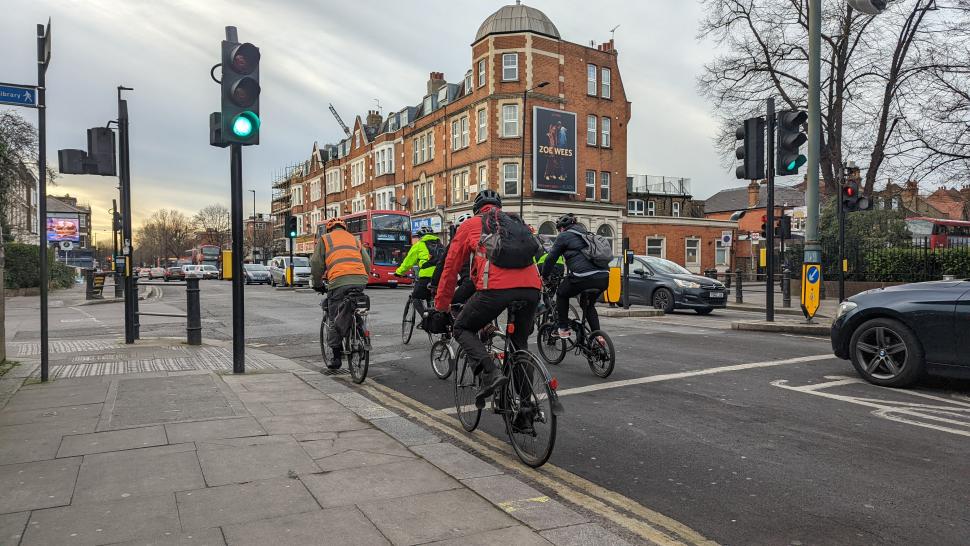 Cyclists at traffic lights, London © Simon MacMichael
Cyclists at traffic lights, London © Simon MacMichael“A second-hand bike costs the same as two tanks of fuel”: Cyclists react to “joke” survey which found that almost half of Brits believe they can’t afford to buy a bike
“How much is motoring insurance, tax, MOT, servicing, repairs, and fuel when you add it all up?” That’s the question currently being posed by baffled cyclists across the UK, after a new survey examining attitudes towards cycling found that almost half of Brits believe they cannot afford a bike, with yesterday’s story on the somewhat contentious study attracting hundreds of confused comments on road.cc and across social media.
The survey was carried out by BHN Extras, the parent company of Cyclescheme, the UK’s largest provider of access to the Cycle to Work initiative, as part of its annual research into perceptions of, and barriers to, cycling in the UK ahead of Cycle to Work Day on 1 August.
Gathering responses from 2,000 people employed across a range of sectors in the UK, the study found that 49 per cent of those surveyed believe that they are not currently in a position to buy a bike outright.
A quarter of those consumers also stated that it would take at least six months to save to purchase a bike, with 50 per cent noting that they would be most likely to buy a bike by splitting the cost and 22 per cent stating that the cost of accessories acts as a deterrent to encouraging them to cycle to work.
Meanwhile, concerns about the stereotypical image of a cyclist also featured prominently in the survey, with 58 per cent of respondents believing that they “don’t fit the bill” of what a cyclist apparently represents.
However, it’s the survey’s headline finding – that almost half of Brits think they can’t afford to buy a bike (though, it must be noted, the survey doesn’t attempt to ascertain why that’s the case) – that has fuelled quite the conversation online.
“That’s ridiculous,” X/Twitter user Chrissetti said in response to yesterday’s story. “It might be too expensive to buy a brand-new bike, but you can get second-hand ones dirt-cheap. You’re not going to win the Tour de France on it, but it’ll be good enough as a commuter bike.”
A road.cc reader concurred: “What a joke. I spent £50 on a second-hand mountain bike in 2011 which I use to commute. I still use it now, and would reckon I’ve done 10,000 miles on it in total. No expensive gear, just helmet, gloves, lights, and waterproofs (which I’ve hardly ever used as it rarely rains enough to warrant it).
“Anyone new to cycling doesn’t need to spend thousands of pounds initially until they know they will continue and want to upgrade.”
Meanwhile, another road.cc reader offered up this handy piece of buying advice: “Buy an early 90s Kona MTB, put some slicks on it. Best commuting bike you’ll ever own. Job jobbed.”
I paid £110 for this bicycle in 2011. It is now 50 years old. I use it for commuting - about 18 miles a day. It works perfectly and has required almost no maintenance. pic.twitter.com/DKKd2mYxTh
— Robert Rhodes (@ra_rhodes) August 2, 2024
Over on Facebook, Chris Alston added: “There are many bike recycling projects across the UK. We don’t all need to buy new. There are some great second hand or pre-loved refurbished bikes available for a good price. The second-hand market has been flooded with bikes that were snapped up during the early stages of the pandemic.
“The Cycle to Work scheme is always an option for those whose employers are signed up. Cycling UK has a Cycle Friendly Employer Scheme to encourage businesses to make the necessary changes to support those who wish to cycle to work. They also have various programmes to help new or returning cyclists build up confidence, fitness, and learn new skills such as cycle maintenance. There’s help available. Some local authorities have certain schemes too.”
While the relatively low cost of buying a bike (unless you’re in the market for the latest S-Works, of course) was a common feature of many of the replies to the story, some readers couldn’t help but point out that, of the 49 per cent who claimed they don’t have the funds for a bike, a decent proportion would be more than happy to spend their hard-earned wages on buying, maintaining, fuelling up, taxing, and insuring a car.
One road.cc reader said: “Given that there were 41.2 million registered vehicles in the UK at the end of 2023, and that according to the 2021 census, there were 37.5 million people of working age, it would be interesting to know how many of those surveyed don’t think they can afford a bike because they already spend a good proportion of their income on owning a car.”
“Can’t afford to buy a bike? You can get one for about £100, and it costs nothing to run. Yet they can afford to run a car, which costs thousands to keep on the road?” asked Lee Jones on Twitter.
“Going with total bullshit for that,” added SCo. “You can pick up a working bike off Facebook marketplace for £50 every day. Even if you budget another £50 for service, that’s about two tanks of fuel, ride to work for a few weeks and the bike has paid for itself.”
“How much is motoring insurance, tax, MOT, servicing, repairs, and fuel when you add it all up?” asked Pooka, a question answered by the Twitter account ‘Yeah But Cyclists’: “Can’t afford a bike which could cost as little as £300 (or even less second-hand) and virtually nothing to maintain or run, but they can afford £1,000+ per year to maintain and run a car?”
However, not everyone was up in arms about the survey’s main finding, with some criticising the rising prices associated with the bike industry in recent years.
“The industry has been pushing prices up and up for years,” said Tom Stringer on Twitter.
Facebook user Paulo also added: “Cycling has become a stupidly expensive sport, it was never very cheap, but nowadays it is too much.
“Some years ago, a reasonable/good bike would have components of some quality and would cost a maximum of £500. Nowadays with £500 you can barely buy anything with two wheels. Something will have to be done to counter this situation and make cycling accessible to the masses again.”
Some, meanwhile, noted that there are other reasons – beyond costs – that prevent them from commuting by bike.
“I would love to cycle to work but the idea of 20km down the A57 in rush hour terrifies me... It’s definitely the idea of sharing space with white vans and w***panzers that puts me off,” said one road.cc reader.
However, others were quick to note that the survey’s findings, detailing the arguably prohibitive costs of cycling, were published by a company whose aim is to encourage people to buy new bikes at a discounted rate.
“Putting aside all the comments regarding how many and who can or can’t afford a bike (in reality anyone who wants a bike can have one, whether it’s bought new, used, or received from charitable source), the upshot is that this so-called ‘research’ was commissioned by a company that has a financial interest in getting as many people as possible to repeatedly buy new bikes via a salary sacrifice scheme, within which they charge one of the highest commission fees in the industry,” said one road.cc reader.
“As with most ‘surveys’ the organisation paying the bill gets the outcome they ask for.”
This led on to a broader discussion surrounding the Cycle to Work scheme in general, which has faced a turbulent period in recent months, as local bike shop owners and traders united earlier this year to criticise a system that they believe is “too complicated”, damaging to retailers, no longer fit for purpose to get more people cycling to work, and in “need of urgent systematic change”.
“The trouble with the Cycle to Work scheme is that most low earners are not allowed to use salary sacrifice because it would take them below the National Minimum Wage,” noted a road.cc reader. “Low earners cannot buy a bike tax-free through Cyclescheme. The government must fix this.”
And Colin McCullough on Facebook said: “The Cycle to Work scheme is bad for local bike shops due to the fees, and privileges higher earners, in company employment linked to the scheme. It discriminates against low paid, unemployed, retired, self-employed... Why not simply cut the VAT rate on bikes? And/or have a rental/leasing scheme, with insurance and maintenance included? Creativity needed from government?”
“The cycle schemes can’t take you below minimum wage, and given how much the minimum wage has gone up in relation to wages in general I wouldn’t be surprised if people can’t afford to take advantage of it,” said Sean.
“However, nearly every major bike retailer has sales on right now, you can pick up a decent bike for not much in the grand scheme of things. Even if you had to pay interest, the money saved on fuel would likely be enough to cancel it out.”
What do you think? Is cycling becoming unaffordable, hindered by a Cycle to Work scheme which does little for lower earners? Or are there more than enough cheap and second-hand bikes floating around to get the UK cycling to work? Let us know in the comments…
After obtaining a PhD, lecturing, and hosting a history podcast at Queen’s University Belfast, Ryan joined road.cc in December 2021 and since then has kept the site’s readers and listeners informed and enthralled (well at least occasionally) on news, the live blog, and the road.cc Podcast. After boarding a wrong bus at the world championships and ruining a good pair of jeans at the cyclocross, he now serves as road.cc’s senior news writer. Before his foray into cycling journalism, he wallowed in the equally pitiless world of academia, where he wrote a book about Victorian politics and droned on about cycling and bikes to classes of bored students (while taking every chance he could get to talk about cycling in print or on the radio). He can be found riding his bike very slowly around the narrow, scenic country lanes of Co. Down.
Latest Comments
- Secret_squirrel 4 hours 47 min ago
Um...no. Spitting is grim and there is never any excuse.
- Another_MAMIL 7 hours 43 min ago
Q36.5 Gregarius Essential Bib Knickers fit the bill: 3/4 length bib tights for warm weather.
- Rendel Harris 7 hours 54 min ago
Jolly good. Only it hasn't been and it is still a public bridleway. Feel free to look it up.
- jaymack 8 hours 44 min ago
"...it feels more like a £100+ jersey". It's almost as if cycling apparel is over priced.
- mike the bike 9 hours 56 min ago
I've had a few Lezyne bits and bobs over the years and while it's true I've never bothered to return anything under warranty, I've had a couple of...
- mark1a 8 hours 59 min ago
There's a transition period. For the benefit in kind (BIK) tax to the employee, it will be treated as a goods vehicle as it is now (rather than a...
- hawkinspeter 10 hours 8 min ago
Parents say East Bristol Liveable Neighbourhood makes roads '100 times safer' for children:...
- mdavidford 10 hours 14 min ago
Isn't basically all carbon recycled? From stars?
- velodinho 11 hours 30 min ago
As witnessed at so many infrastructure improvement projects similar to this one, all those who object should ignore the consultation and pray at...
- Nagai74 13 hours 18 min ago
It's a DLO to those in the trade.
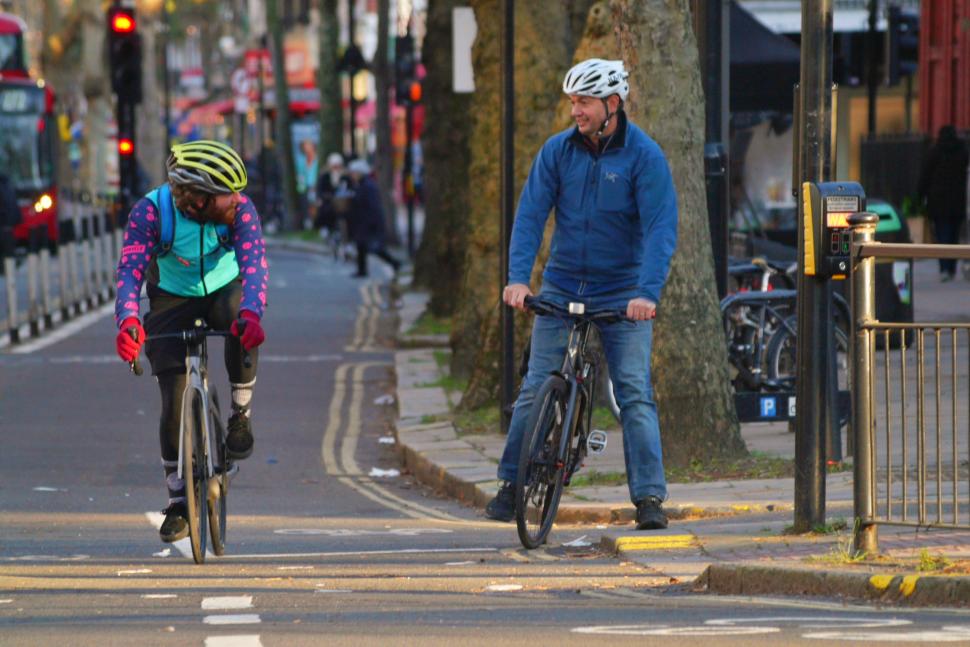
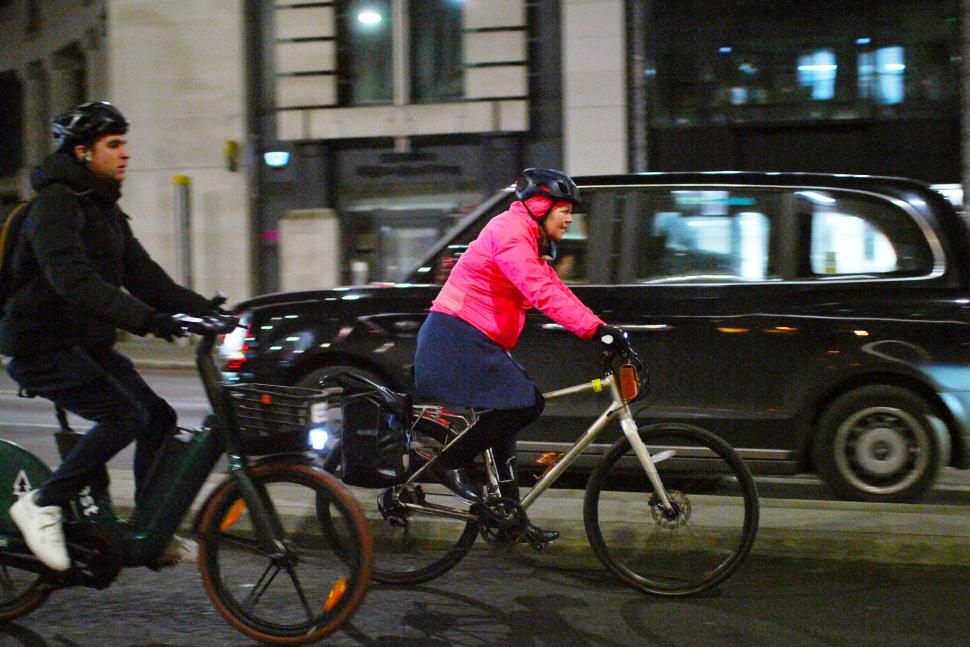
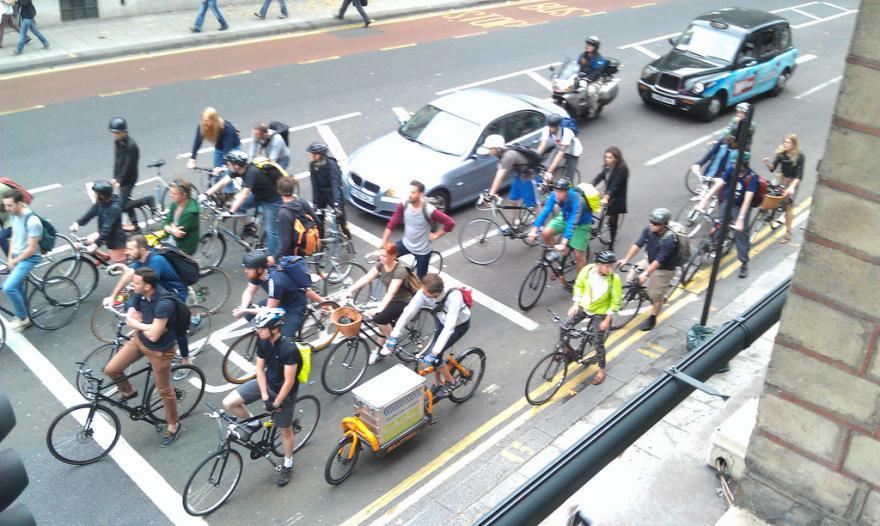
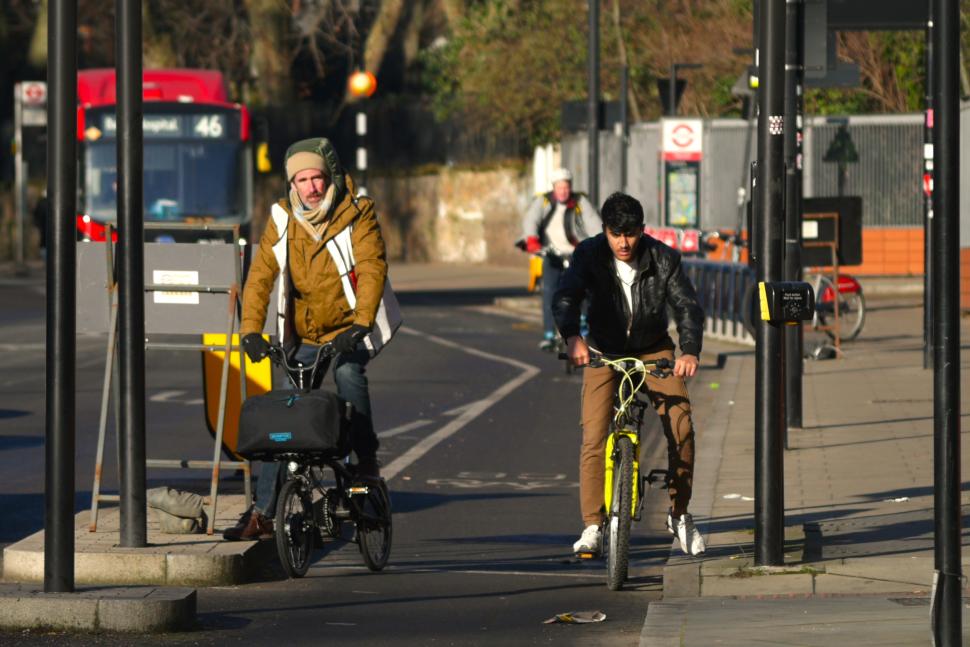
Add new comment
97 comments
Wear resistance is bad at both the cheap and the expensive end of the bike market, poor material quality and very low weights both have their consequences for wear resistance.
While the headline is true, one has to admit that these riders on the first pics have spent a few thousands, not "2 tanks of fuel".
In addition to my new bike, I have already spend as much in tools, clothes, tyres, etc. this year... and nothing really fancy, half of it was bought on Aliexpress or 2nd hand - and I'm not yet fully equipped!
Wonder what goodies you're buying there?
You could spend over 10 grand on a bike, and thousands per year (road.cc reviews will help ).
Equally you could get, equip and run a perfectly good enough bike for a looong time for that money. (Did with my nth hand old Dawes Galaxy, including some touring as well as daily chores.)
Only exceptions I can think of are more niche uses or if you're only prepared to walk into a store and buy everything new - but even then, see Decathlon / Halfords.
I'm not sure how you have made that calculation but many people ride bikes that are worth far less than you may think. OTOH don't forget that that for some people their commute machine is also used for a weekend pastime.
My original commuter bike was a Kona rigid MTB that was already 10 years old when I started riding to work on it. It did that job for another 14 years (though was not used every day after I bought a road bike) and still on the original wheels. Its replacement is a used Pinnacle road bike bought for £150 from a local ebay seller. After 2 years I replaced the wheels with some s/h Giant P-R2s that I had a clubmate was selling for £70 because he upgraded the wheels on his new Defy; they are still doing fine after 12,000 miles of year-round riding.
While you can make cycling expensive it's simply not necessary to do so.
I hate to think how much tools to do car maintenance are.
You must be very hard on your bikes. My oldest one is now 35 years old. I lost track of how many miles it'd covered a long time ago. It still works.
Absolute nonsense. You could buy a very nice bike once per year for the annual running cost of a car!
If you have a high end bike and use it as a commuter then that is your choice but decent road bikes are not designed for commuting on they are designed for low weight and performance. If you want durability build a commuting bike with older tech.
As for bike shops not doing lower end options. That is because it's so hard to make a living out of them! Same with bike repairs. It doesn't matter if how much the bike is worth it's still takes time to fix it and even though bike mechanics get paid a pittance it still adds up!
Nonsense about comparison with car but correct about need to allow about £10 a month for cost of running a bike, maybe £15 if you hammer it for lengthy commutes and unavoidable sharp stuff on roads and cycle lanes.
Here is the other view. If you are young and not well off you live in a shared apartment and there is no space for mainenance not to mention the cost of a set of tools. My experience is second hand I have 2 daughters. Then the second hand bike: often many worn out parts. Bike parts are a complete ripoff, the cost of all the parts on a bike is way more than a new bike. So you also can't do the work yourself it will be £100+ in a bike shop. Then security: when you finally have a working bike after crossing all those hurdles it gets stolen. Report it to the police... they don't give a s***t, it is the lowest of their priorities. So smart Alec tells you you should have bought a decent lock which will cost you £££. I am lucky, at my stage of life I have a garage full of tools in a quiet village where bikes are seldom stolen. If you are a young person your experience is likely to be the very opposite.
I think you're painting an exaggerated picture.
If people can't/won't learn how to replace simple things like brake pads, cables and tyres themselves then yes it will cost money, just like refusing to learn to cook would result in them eating lots of takeways and ready meals.
A good relationship with a local shop or mechanic is very worthwhile and few jobs cost £100. In the past my LBS has loaned me a bike or wheel to keep me mobile while a job is in the workshop. Components cost money, they have to be made, shipped, stocked and fitted. Anyone who runs a business knows how much it costs just to keep the lights on and staff to work for them; everyone has to have some margin to stay afloat.
As for home maintenance, lots of people in apartments etc can fix stuff outside/under cover or in a friend's shed or garage. There are community groups that help people with repairs such as CUK's Bike Revival project. Recently I replaced tyres, tubes and rim tape on a colleague's Raleigh Pioneer during my lunch break at work. I only needed tyre levers, a pump and a 15mm spanner.
My kids' bikes required hardly any maintenance during the 5 years the rode to school daily. My daughter's Specialized hybrid cost me £80, it did 1,000 miles/year to college for 3 years, and has needed little more than a chain, cassette and brake pads at intervals while a £10 combination lock is used (is that adequate?) in town. I bought a pair of tyres for £10 from a local facebook group that will I wil have to replace eventually. Compare that with CBT, m/c test, buying and insuring a small motorbike or 50cc scooter.
A D-lock or chain type may cost as little as £25, you don't necessarily need an expensive one.
Just like most things - if you start from square one (not knowing what you don't know, not being confident in skills, no (good) tools or spares) ... it's hard. And possibly (relatively) expensive.
I agree about the problems of theft having been decriminalised (although many years ago when I was at uni theft was not uncommon either - people have been targeting students / student residence forever).
Also about lack of storage space in more affordable accommodation. Government policy would help here *.
A question though - what do you think it should cost? Can you find any other form of transport where it only costs you 100 pounds or so per year? Even just walking you're going to get through some shoes - and you'll likely end up jumping on public transport / using taxis occasionally anyway.
* See what they do in NL - https://bicycledutch.wordpress.com/2013/07/11/parking-your-bike-at-home/
Also you might be lucky and or prepared to put a bit of work in. You can get a bike for very cheap (even new now) and if you take a friend / read up before hand (Internet and how to videos are legion) you can probably get a decent one.
Of course businesses aim to upsell - which will then affect 2nd hand market. So yes as usual it's actually possible to end up with a cheap bike which is a bit of a "racehorse" to maintain. I know when I was younger I didn't want to be seen on (what I thought was) a clunker...
In my opinion generic parts are in fact pretty cheap (again - how much do you *think* they should be? Ask yourself when you formed that impression).
In some cities there are charities which offer "fix your bike" facilities for less money or you can borrow their tools (and often help / free spares) and just pay for the time you're there.
Even just doing nothing and paying a shop for a yearly service is probably only gong to cost 100 quid or so (maybe less if bike in decent shape). Again - you have to compare that to other options!
You should see what the price of all the car parts added up comes to, compared to a new car.
Think that's bad? Try comparing the price of a complete set of human organs with that of a brand new, unused baby
Is that available in-store or only online?
Depends on where you live and who you're friends with.
Available online, but you have to pay extra for home delivery.
I'll go with the baby then, the organs might not be compatible with my frame. Home deliveries are still fashionable I hear so I'll get the hot water and towels ready.
On account of the current high demand we're unable to guarantee that the baby you receive won't be addicted to heroin or the like. And if you're in the UK you'll have to pay extra for disposing of the mother afterwards. For customers in Russia and China that service is provided free of charge.
If they couldn't make up barriers to starting cycling they'd have to be honest and say they just don't want to cycle. "It's a bit hard" doesn't really wash.
My thought exactly. Most of them are not actually saying "I can't afford a bike". They're really saying "I don't want a bike".
"I've spent all my money on a car."
I think it's fair to point out that decent enough second hand bikes are not that expensive, even if you add in a service and new kit. However, some of the costs of driving a car won't go away if you take up cycling unless you ditch the car altogether. For most people, cycling to work will replace some car journeys, but not enough to get rid of their car. At least not in advance.
I always get confused when I try to read about issues to do with the Cycle to Work scheme, which is a sure sign it needs revised. I'm assuming you can't currently buy a second hand bike, which is possibly fair enough if it's from some random bloke on Ebay, but it should be possible for proper shops that sell 2nd hand bikes to be considered.
But as the article says - there are other ways to reduce the financial burden of cycling that recognises society benefits when more of us pick two wheels over four.
You can buy a used bike with a Cycle To Work Scheme.
That's good to hear, thanks.
That's interesting - though as they seem to focus on the premium second hand market with their current cheapest second hand urban / commuter bike at £995, doesn't really address the affordability point.
Mmeeeeeoooooww the claws are out in the comments section today 🤣
I'm just sore because I didn't get quoted in the article about the article about the survey.
Third time's the charm...
I'm looking forward to tomorrow's article which reports the online reaction to the report of the online reaction to the original story.
Pages